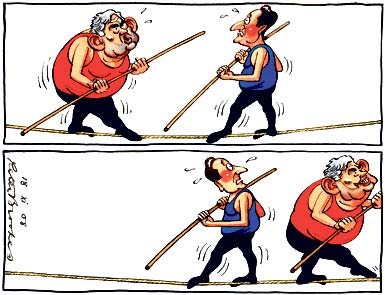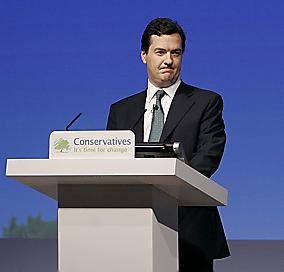It would be nice to think that with various tax havens having to promise to be rather more transparent in their operations than they have been previously, threatened with being "named and shamed" by the OECD, that the actual businesses which exploit such havens would be following a similar trajectory. The sad reality is that both will continue to get away with it just as they have in the past: they'll wait for the current mood to slowly wither away, as it will when the economy eventually recovers, and then the same old lawyers and same bean-counters will be back to doing what they do best, letting the rich and powerful get away it while castigating the scum at the bottom who dare to fiddle their benefits.
Barclays however hasn't even bothered with letting it all blow other. Despite being in negotiations with the Treasury, threatened by its toxic assets, which it wants the government to insure, it still succeeded in gaining an injunction against the Guardian, stopping it from hosting documents detailing "Project Knight", a tax avoidance scheme devised in Feburary 2007 which could have seen the bank save between £40m to £60m in a single year. This is despite the fact the scheme is not illegal, and that Barclays even says that it fully informed Her Majesty's Revenue and Customs of what it was doing. Why then is it so desperate for the documents not to enter the public domain? Is it ashamed of what it was doing, legal though it was? Barclays' lawyers Freshfields argued that the documents were property of the bank, and that could only have been acquired by someone who had breached confidentiality agreements.
Sadly for Barclays, either the documents were up long enough for someone to mirror them, or they were also distributed to Wikileaks, increasingly becoming vital against legal threats of all varieties, where they are still fully available. Not just is the proposal for Project Knight included, but also documents detailing the setting up of a "Brazilian Investment Strategy", "Project Brontos", "Project Berry II - Investment in Index Linked Gilts", "Project Faber", "Project Valiha" and a memo detailing the minutes of a meeting of Barclays' Structured Capital Markets team concerning the setting up of an office for SCM in Luxembourg. Most interesting to do with the injunction issued against the Guardian is the involvement of Freshfields with Project Faber. Normally you would imagine that Barclays would have employed a separate legal firm to deal with the media, as Freshfields is ostensibly only involved with business law advice, but in this instance they seem to have decided not to do so. This raises a potential conflict of interest because the document on Project Faber details Freshfields' legal advice on the tax risk which the project would incur, and unlike the other documents where the risks are summarised fairly succinctly, Freshfields goes into quite some detail on five specific UK risks which Faber raises. Again, there's no suggestion here that either Barclays or Freshfields has done anything specifically illegal, but it also certainly seems to be in Freshfields' interest, as well as Barclays', to stop the documents from entering the public domain.
I won't pretend that I understand much of these documents, nor probably would 99% of the other people in the country, unless we had the likes of "Slicker" from Private Eye personally explaining them to us, but Richard Murphy is another man who does and who was asked by the Sunday Times to look at them after they were first passed them but didn't publish them in full. He described Project Valiha thusly:
It is designed so the money goes round in a big circle and comes back to Barclays so that they make £99m in tax savings without taking any risk at all. The whole thing takes three days.
As for the others:
“They work on the basis of exploiting tax regulations and the laws of different countries. They don’t generate any real profit for anyone, but they do save vast amounts of tax that they would otherwise pay.”
The Sunday Times claimed that Barclays might have been saving up to £1bn in tax through the various schemes, something the bank has vigorously denied. Murphy has though commented rather further on the schemes, of which it seems there might be even more which haven't turned up on Wikileaks:
I’ll tell you what I think is going on with Barclays. In my opinion it has constructed a series of wholly almost entirely artificial transactions undertaken through a significant number of separate legal entities, most under the control of Barclays itself, but some, inevitably, owned, or controlled (and in these deals it is always difficult to define what that might mean, deliberately) by the counterparty to the transaction - in most cases banks such as Goldman Sachs, Deutsche Bank, Credit Suisse, Fortis and so on.
Those entities have been in a number of jurisdictions, the UK and the Cayman Islands being the most common, but Luxembourg also being a participant. Some have been limited companies, some limited liability partnerships.
Some of those entities, even when incorporated elsewhere are tax resident in the UK, and some are not.
Some account under International Financial Reporting Standards. Some account under UK accounting standards.
It would seem that Barclays are trying to realise profits that they have ‘manufactured’ in most cases through these immensely complex structures by arbitraging (trading off) international taxation law, company law in various jurisdictions and even accounting standards, to achieve taxation results that mean that profits are realised or sold without taxation liabilities arising for Barclays.
The result has been a deliberate attempt to defraud – by which term I mean seeking to secure a financial advantage by deception, although not (I stress) illegally.
The deception has been on three parties. The first has been tax authorities who despite their brave statements to the contrary did not, I suspect, know the full details of some of these arrangements. It would seem that some may not have been disclosed to them.
Secondly, Barclays have sought to defraud (using the above definition) the taxpayers of the UK and maybe elsewhere who have not received the funds rightfully due to them on profits declared.
Thirdly, I think they have defrauded (using the above definition) their shareholders by declaring profits which were not, in my opinion, sustainable and which were manufactured through preconceived and structured financing deals in which the counterparties played a remarkably small part in exchange for what was, in effect, a fee to allow Barclays to record realised profits by turning the manufactured profits into third-party transactions.
This seems to be the real reason why Barclays is so desperate to keep the documents out of ordinary people's hands. They realise that they are some of the first real hard evidence to emerge of just how specialist teams within the banks sought to avoid tax, and who were subsequently incredibly richly rewarded for their work, with Murphy claiming that the head of Barclays' SCM division may well have been earning an astonishing £40m a year (other sources claim it could be £75m, for which see this revoltingly sycophantic article), about the same amount as that which one of the schemes would have saved the bank. In order to offset such huge remuneration, the profits from the avoidance would have had to have been far higher, and the £1bn a year figure no longer looks as nonsensical as Barclays claim. It somewhat puts Fred Goodwin's pension, even the £3 million lump-sum we now know he received into perspective, hence why Murphy has put up a further four posts on what should be done. At the very least we need to stop apologising for and excusing tax avoidance and demand that companies, in the words of Alistair Darling, don't just adhere to the letter of the law but also the spirit of it. Great public anger over the bailing out of the banks has not yet reached boiling point, but the Barclays revelations may just push the mercury further towards the top.Labels: banks bailout, Barclays, economics, legal threats, Richard Murphy, tax, tax avoidance







